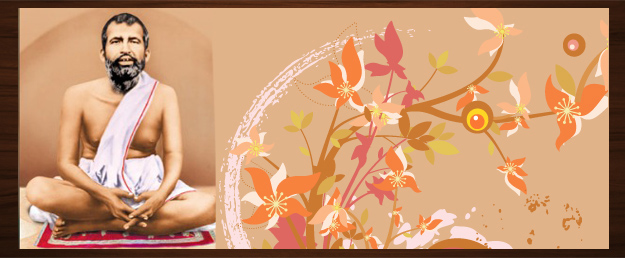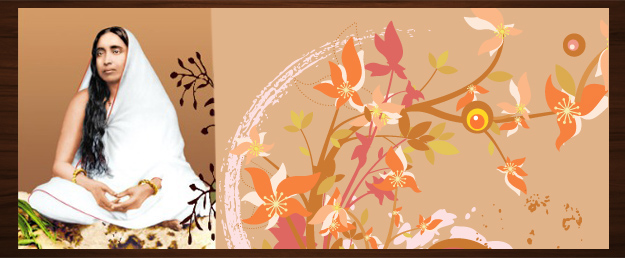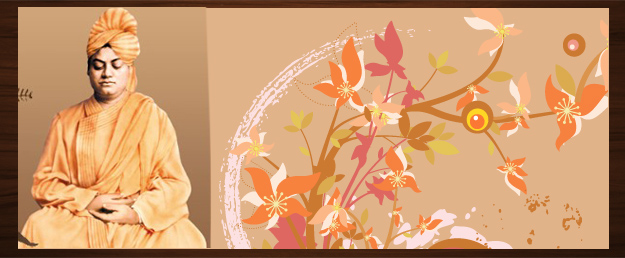
Sri Ramakrishna (1836-1886), the great religious prophet of modern time was born in 1836 from poor and pious parents in a rural village near Calcutta.
He spent his childhood in the fields and gardens of his native village. He disliked going to school as, in his words, ‘the so-called education is for earning money only’, and would instead serve the monks who stopped at the village while on pilgrimage and listen to their religious conversations. As a young man he was assigned some priestly work in a recently built temple near Calcutta, where he practiced Hinduism, Christianity and Islam, realizing their truths with utmost ease.
He proclaimed that God exists and can be realized, and affirmed that we must be sincere, earnest, persevering and diligent in our spiritual practices if we want to achieve the goal of human life, i.e. God realization.
He reaffirmed the ancient principle of Vedanta that each human being is divine, when seen as one’s real and immortal Self.
By his own realization, he also brought out the ancient truth that all religions lead man to the same goal.
Soon the word spread about this remarkable man and people of different social status and creed began to come to him. He became known as Ramakrishna Paramahamsa and like a magnet he attracted real seekers of God. He taught ceaselessly the basic truths of religion for the rest of his life through parables, metaphors, songs and above all by his own life.
When he passed away he left behind a group of young disciples headed by Narendra, later to become the well-known scholar and orator Swami Vivekananda.
Sayings
God is formless and God is possessed of form too. And He is also that which transcends both form and formlessness. He alone knows what all He is. For the sake of those that love the Lord, He manifests Himself in various ways and in various forms. Verily He is not bound by any limitations as to the forms or manifestations, or their negation.
It is not good to feel that one’s own religion alone is true and all others are false. God is one only, and not two. Different people call on Him by different names: some as Allah, some as God, and others as Krishna, Siva, and Brahman. It is like the water in a lake. Some drink it at one place and call it 'jal', others at another place and call it ‘pani’, and still others at a third place and call it ‘water’. The Hindus call it ‘jal’, the Christians ‘water’, and the Mussalmans ‘pani’. But it is one and the same thing. Opinions are but paths. Each religion is only a path leading to God, as rivers come from different directions and ultimately become one in the one ocean.
If I hold this cloth before me, you cannot see me anymore, though I am still as near to you as ever. So also, though God is nearer to you than anything else, yet by reason of the screen of egoism you cannot see Him.
If, after all, you cannot destroy this “I” then let it remain as “I the servant”. The self that knows itself as the servant and lover of God will do little mischief.
When shall I be free? When that “I” has vanished. “I and mine” is ignorance; “Thou and Thine” is knowledge.
The intoxication of the hemp is not to be had by repeating the word “hemp”. Get the hemp, rub it with water into a solution and drink it, and you will get intoxicated. What is the use of loudly crying “O God, O God”? Regularly practice devotion and you shall see God.
As the tiger devours other animals so does the ‘tiger of zeal for the Lord’ eat up lust, anger, and the other passions. Once this zeal grows in the heart, lust and the other passions disappear.
The darkness of centuries is dispersed so soon as a single light is brought into the room. The accumulated ignorance and misdoing of innumerable births vanish at one glance of the gracious eyes of God.
The nearer you come to God, the more you feel peace. Peace, peace, peace-supreme peace! The nearer you come to the Ganges, the more you feel its coolness. You will feel completely soothed when you plunge into the river.
Pray to Him in any way you will. He is sure to hear you, for He hears even the footfall of an ant.

Sri Sarada Devi (1853-1920), was Ramakrishna spiritual consort. She was born in a very pious but poor family in a small village not far from Calcutta. According to the Indian custom of the time, they were married when she was still at a very young age. Hence she grew up with her family in her ancestral home in the province. When she finally joined her husband in Calcutta at age seventeen, in a way she became Ramakrishna’s first disciple. He immediately started training her both in spiritual and practical matters. Their relationship was unique and profound and their marriage was never consummated, being nothing but a divine union. Ramakrishna regarded Sarada Devi as the embodiment of the Divine Mother of the Universe. In spite of her very hard life, Holy Mother, as she later became known, was a living example of strength, courage, wisdom, renunciation and above all Universal Motherhood. After Ramakrishna’s passing, she became his successor and a spiritual teacher in her own right, giving spiritual guidance to thousands of people. Indeed Holy Mother had many more disciples than did Ramakrishna. She taught by examples and not by preaching. She looked like an ordinary woman and yet she manifested intensely her divinity in everything she did, no matter how mundane or insignificant.
Sayings
You see, it is the nature of water to flow downwards, but the sun’s rays lift it up towards the sky; likewise it is the very nature of the mind to go to lower things, to objects of enjoyment. But the grace of God can make the mind go towards higher objects.
One must perform work. It is only through work that the bondage of work will be cut asunder and one will get a spirit of non-attachment. One should not be without work even for a moment.
Many are known to do great works under the stress of some strong emotions. But a man’s true nature is known from the manner in which he does his insignificant daily tasks.
Everything depends upon one’s mind. Nothing can be achieved without purity of mind. It is said, “The aspirant might have received the grace of the Guru, the Lord and his devotees; but he comes to grief without the grace of ‘one’.” That ‘one’ is the mind. The mind of the aspirant must be gracious to him.
From desire comes this body into being. When there is no desire at all, the body falls away. With complete cessation of desire there comes the final end.
Just as clouds are blown away by the wind, so the thirst for material pleasures will be driven away by the utterance of the Lord’s name.
There is no happiness whatsoever in human birth. The world is verily filled with misery. Happiness here is only a name. He on whom the grace of the Master has fallen alone knows him to be God Himself. And remember that is the only happiness.
Practice meditation, and by and by the mind will be so calm and fixed that you will find it hard to keep away from meditation.
If you pray to him (Sri Ramakrishna) constantly before his picture then he manifests himself though that picture. The place where that picture is kept becomes a shrine.
The easiest and best way of solving the problems of life is to take the name of God, of Sri Ramakrishna, in silence.

Swami Vivekananda (1863-1902) was born Narendranath (Narendra) Datta in Calcutta. Since he started college, he showed great energy, leadership and extreme intelligence. He was also a fine singer and could play several instruments. When he first met Ramakrishna in 1881, Narendra was intrigued and puzzled by his personality. On one hand young Narendra, brilliant and fiercely independent, dismissed a large portion of his Hindu heritage as largely superstitious and on the other he was attracted by the deep and radiant holiness of Ramakrishna. With his frequent ecstasies, his innocent directness of a child, his intense joy in God, Ramakrishna made an indelible impression on Narendra. In him, Narendra found a man who dared to say that he saw God, that religion was a reality to be felt and experienced in an infinitely more intense way than the world. After continuing to visit Ramakrishna regularly for some years, Narendra gradually found himself the leader of his Master’s disciples, most of them about his own age, whom the Master was training for monastic life. After the passing of Ramakrishna, at first a small monastery was established at a house of a devotee, where his disciples could hold together, then they started to travel as wondering monks all over India. In 1893, Narendra, who by then had assumed his monastic name of Swami Vivekananda, traveled to Chicago to attend the Parliament of Religions. It was probably the first time in the world’s history that a venue had been organized for the representatives of all major religions to gather in one place with freedom to express their beliefs. His speech, started with the simple truth “Sisters and Brothers of America”, became the centerpiece of the event and ended in a standing ovation. After this event, Vivekananda spent nearly two years lecturing throughout the United States where he met some of the most prominent personalities of the time. His message to the West and the East was to trade their best values. Upon return to India in 1897 he established the Ramakrishna Order, with the motto “For one’s own spiritual realization and for the good of the world”, an integration of educational, philanthropic and religious activities. Based in Calcutta, the Order now has 218 centers in India and worldwide, devoted to contemplative life and social service. By the time Vivekananda passed, he left behind a monastic organization rich in spirituality, as well as a large literature of writings and recorded words.
Sayings
Never mind failures; they are quite natural, they are the beauty of life, these failures. What would life be without them? It would not be worth having it if it were not for struggles. Where would be the poetry of life? Never mind the struggles, the mistakes. I never heard a cow tell a lie, but it is only a cow, never a man. So never mind these failures, these little backsliding; hold the ideal a thousand times; and if you fail a thousand times, make the attempt once more.
The remedy for weakness is not brooding over weakness, but thinking of strength. Teach men of the strength that is already within them.
If you have faith in the three hundred and thirty millions of your mythological gods, and in all gods that foreigners have introduced into your midst, and still have no faith in yourselves, there is no salvation for you. Have faith in yourselves and stand up on that faith.
Unselfishness is more paying, only people have not the patience to practice it.
This life is short, the vanities of the world are transient, but they alone live who live for others, the rest are more dead than alive.
As I grow older I find that I look more and more for greatness in little things. Anyone will be great in a great position. Even the coward will look great in the glare of the footlights. The world looks on! More and more the true greatness seems to me that of the worm doing its duty silently from moment to moment and hour to hour.


